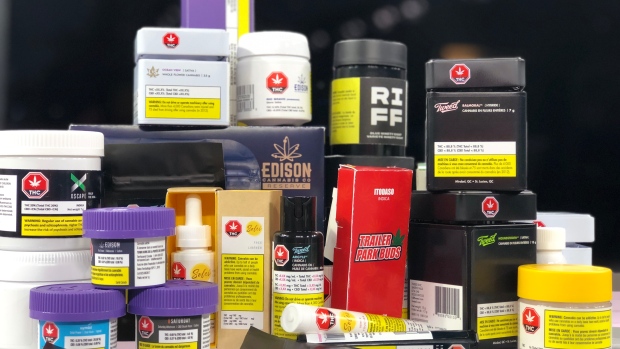Nov 16, 2018
Cannabis firms spent millions marketing their pot last quarter – did it work?

Cannabis producers that reported earnings this week may not have shown strong recreational cannabis sales in the lead-up to legalization during the last quarter, but they sure spent millions of dollars trying.
Sales and marketing costs soared for all five major publicly-traded pot producers in the last quarter, collectively tripling the amount of money spent informing Canadians about recreational marijuana up to a minute before midnight on Oct. 17, when the country legalized the drug. The five companies spent a cumulative $74 million on marketing in the last quarter, compared to about $23 million last year.
The million dollar question: Did it work?
It might be too early to tell. The embryonic days of legal cannabis have been mired in a countrywide supply shortage amid staggering demand for dried flower, pre-rolls and oils regardless if a company spent a little or a lot on its marketing plans.
“It hasn’t been overly effective, but I think that a lot of this marketing spend hasn’t seen the light of day yet,” said John Yorke, president of Rain43, a Toronto-based strategy and digital marketing agency.
“Did the brand’s voice get out into the market? Not really. But it also could be a case of someone looking to make the first move and are willing to get slapped down by Health Canada.”
In the months leading up to Oct. 17, producers like Canopy Growth Corp., Aurora Cannabis Inc. and CannTrust Holdings Inc. erected billboards, sponsored film festival parties and booked strip clubs to get the word out about their soon-to-be-available recreational pot brands. In Canopy's case, it has the distinction of spending more on sales and marketing ($39 million) than it earned in revenue in its last quarter ($23.3 million).
"Up to Oct. 17, you could advertise Tweed on a lot of billboards across the country. That all stopped at 11:59 p.m. on Oct. 16," said Canopy Chairman and Co-CEO Bruce Linton in a phone interview with BNN Bloomberg, referring to when the Cannabis Act took effect.
Linton said he expects the company's marketing spend to be "clipped back by a lot” in the coming quarters. He added an unspecified amount of Canopy’s sales and marketing budget went toward training 650 retail staff at its Smiths Falls, Ont. headquarters and hopes the "momentum" of that investment can carry for several months until edibles – and the attention that product will bring – will hit the market.
"This is all new," he said. "People have models on how things are supposed to work perfectly after prohibition, but we don’t know how they came up with those models."
Cam Battley, chief corporate officer at Aurora Cannabis, said the company is likely to pare down its sales and marketing budget by about half of the $29.3 million it spent in the last quarter.
“We had that window of opportunity where the regulations were looser than they are now,” Battley said in an phone interview with BNN Bloomberg. “This was money well invested.”
Aurora may also have benefitted from the free advertising it earned every time the company’s stock moves made headlines amid the rampant volatility of the cannabis sector on public markets, Battley added.
To launch CannTrust’s recreational brands, the company rented out For Your Eyes Only, a strip club in downtown Toronto, in August which cost about $100,000 as well as outfitting another Toronto-area concert venue for a legalization party that showcased its offerings. But CannTrust’s recently appointed CEO Peter Aceto says that money was well spent amid the early days of its recreational rollout.
“The initial feedback we’re getting from the provinces is that the CannTrust products are well received in terms of price, quality and value,” Aceto told BNN Bloomberg.
With the Cannabis Act now law, some producers are looking at innovative ways to abide by the new restrictions on marketing legal marijuana in Canada. For example, Linton said Canopy Growth is tying up exclusive contracts with advertising companies that display ads in bar washrooms.
“We’ve got to put our stuff now in ‘age-gated’ places that only let people over 19-year-olds see them,” he said.
But some producers are being more judicious with their marketing costs. As Moncton, N.B.-based Organigram Inc. is smaller than some of the larger players out there, it’s trying to be more strategic and focusing its marketing budget on training retail staff, said Ray Gracewood, the company’s chief commercial officer.
“I don’t think you can ask anyone to name three brands of cannabis out there right now,” Gracewood told BNN Bloomberg.
“That ‘spray-and-pray’ approach is one that in some cases might work but in our view, it’s undisciplined and doesn’t have a long-term impact. Just because you can spend an endless budget, but it doesn’t mean it’s a good thing to do.”
Cannabis Canada is BNN Bloomberg’s in-depth series exploring the stunning formation of the entirely new – and controversial – Canadian recreational marijuana industry. Read more from the special series here and subscribe to our Cannabis Canada newsletter to have the latest marijuana news delivered directly to your inbox every day.




